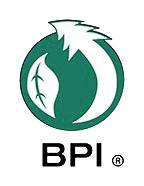
Notice: Undefined index: id in /var/www/vhosts/northcoast.coop/htdocs/assets/common.php on line 309
Notice: Undefined index: id in /var/www/vhosts/northcoast.coop/htdocs/assets/common.php on line 314
Notice: Undefined index: id in /var/www/vhosts/northcoast.coop/htdocs/assets/common.php on line 367
Packaging Updates: PFAs
 The Biodegradable Products Institute (BPI) is now requiring new testing for all their BPI certified products to be less than 100 parts per million for PFA chemical presence by December 2019. BPI certifies 7,000 products, including the many different prepared foods packaging brands and items used by our Co-op.
The Biodegradable Products Institute (BPI) is now requiring new testing for all their BPI certified products to be less than 100 parts per million for PFA chemical presence by December 2019. BPI certifies 7,000 products, including the many different prepared foods packaging brands and items used by our Co-op.
Per- and polyfluoroalkyl substances (PFAS) are a group of man-made chemicals that includes PFOA, PFOS, GenX, and many other chemicals. which are most commonly used in to-go food and prepared food packaging. Their function is for grease or oil resistance- to ensure food does not adhere to wrappers or containers. PFAs can be found in most products that offer non-stick, waterproof, or grease repellant qualities.
Many Co+op branded products used at the Co-op are already PFA-free, as are all clear PLA (plant-based plastic lookalikes) materials. This includes our orange and green Bio-Plus Terra hot and cold food boxes, all coffee cups, all cold cups, all soup cups, and our clear produce bags.
The plant-fiber molded containers and paper deli wrap that are unlined with any coating is where you will often find PFAs as they are added during production and eliminate the need for a “post-process coating or other treatment on the finished product” as described by supplier World Centric. Work is underway to replace these packaging items with items that meet the new testing requirements.
PFAs are approved by the FDA. Recently, it’s been suspected that while short-chain PFAs are FDA approved they may still pose many of the same bio-accumulative risks as their long-chain chemical counterparts (with 8 or more carbons, PFOA and PFCA). For this reason, large certifying institutes such as BPI and the EPA are removing it from approved substance lists. According to the EPA there are new “regulatory actions to address PFAS substances in manufacturing and consumer products”.
Because of the movement to remove PFAs, many manufacturers are already addressing this concern and actively seeking available alternatives in 2019. An alternative is adding bio-lining to previously unlined products that used PFAs and eliminating PFAs as an ingredient even without a substitute, when necessary.
Alternatives that are always free of potentially harmful additives are stainless steel and glass-ware, which customers are encouraged to use at the Co-op along with any other personal durables.
Stephany, M., & World Centric. (2018). PFAS: Per and polyfluoroalkyl Substances [Letter to Dear Concerned Parties]. United States, Petaluma, California.
Environmental Protection Agency. (2018, July 20). Risk Management for Per- and Polyfluoroalkyl Substances (PFASs) under TSCA. Retrieved from https://www.epa.gov/assessing-and-managing-chemicals-under-tsca/risk-management-and-polyfluoroalkyl-substances-pfass
Notice: Undefined index: id in /var/www/vhosts/northcoast.coop/htdocs/assets/footer.php on line 6
Notice: Undefined index: id in /var/www/vhosts/northcoast.coop/htdocs/assets/footer.php on line 13
Notice: Undefined index: parent_id in /var/www/vhosts/northcoast.coop/htdocs/assets/footer.php on line 20
Notice: Undefined index: id in /var/www/vhosts/northcoast.coop/htdocs/assets/footer.php on line 20